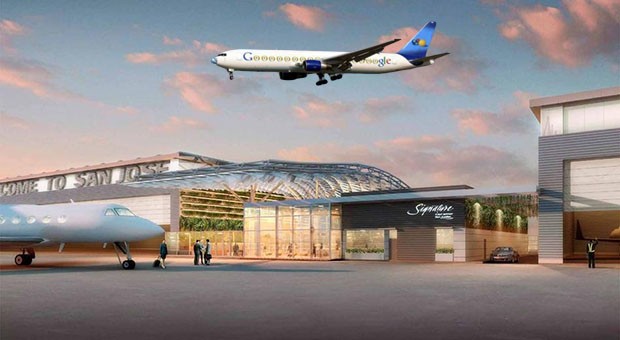Google operates its own system of private buses.
The coaches zip up and down the San Francisco peninsula five days a week. The buses are sorting mechanisms. They help re-organize the Bay Area geographically, residentially, racially, between the tech industry’s uber-haves, and the rest who have not the luck to be employed by a company with its own fleet plush, air-conditioned, wi-fi shuttles.
But Google also has a fleet of airplanes. If the buses are emblems of the tech boom’s stratification of the Bay Area, planes probably signify something on a planetary scale.
Last month, Google’s top three billionaires—Sergey Brin, Larry Page, and Eric Schmidt—effectively bought a portion of the San Jose Airport to hangar their jets. Google’s privatized airport will host at least eight aircraft owned by the three Google executives, including a customized Boeing 767. The airport will host planes for other tech elite of Silicon Valley.
| Privatized transportation infrastructures, from bus systems to airports, seem to be the rage among California’s Internet tycoons. |
Oracle Corporation CEO Larry Ellison is famous for his squadron of private jets but doesn’t own the airport. The privatization deal with Google’s executives is a first. Only a few airports in U.S. history have been privatized.
The public face of the privatization deal to purchase a huge chunk of San Jose’s airport is Signature Flight Support. Signature is owned by BBA Aviation, a British company that specializes in building and operating exclusive airports for the global elite.
As the company’s web site explains, Signature is “focused on regions with high business jet populations.” Regions with high business jet populations are synonymous with regions having large concentrations of the 1 percent. In the Bay Area resides at least 50 billionaires.
Signature will build and operate a fully private airport terminal and runway system on 29 acres of the western end of San Jose’s municipal airport for Google and its friends. While the actual ownership of the land will remain with the city, the concession’s 50-year term in effect transfers ownership completely to Google’s agent, Signature.
In return the airport will receive $2.6 million in annual rent. The San Jose Airport, which is a department of the City of San Jose, won the promise also of a minimum investment of $82 million by Signature in the terminals and runways to be constructed to accommodate the private fleet of jets. Signature gladly agreed. As notes from the March 2013 meeting of the Airport Commission make clear: “Signature would not invest $82 million without ensuring they have an adequate return on investment and they believe that the incremental business such as their partnership with Blue City Holdings is an example of the business that is available.”
“The business that is available” is a roundabout way of saying there’s probably now more than a few young billionaire and millionaire types in Silicon Valley who just aren’t content owning their own airplane, or even private fleet of jets, but who have so much money they want their own airport too. Privatized transportation infrastructures, from bus systems to airports now, seem to be the rage among California’s Internet tycoons.
Google is apparently in no mood to cool its jets. It wants the airport now.
A memo from city to developer sent May 3 describes “a plan to expedite the City development permit process to work at the speed of business,” and to, “ensure that Signature’s subtenant, Blue City Holdings San Jose, LLC, is able to park aircraft on the site as soon as possible.”
Blue City Holdings San Jose LLC is the special holding corporation the boys from Google set up apparently to take over part of the San Jose Airport. Blue City Holdings LLC is a separate holding corporation established, it appears, to manage the airplane assets owned by Brin, Page, and Schmidt, for tax purposes mostly. The lawyer administering BCH San Jose LLC for Google’s billionaires specializes in the financing and tax structure of aircraft ownership for the wealthy, according to his law firm’s web site. Aircraft are tax deductible business expenses thanks to years of lobbying by corporate executives. Under law, there is a pretty generous depreciation schedule that can knock significant sums off a person or company’s tax bill.
The corporate lawyer for Blue City Holdings is Teling Peterson, the CEO of Hillspire, LLC, a boutique wealth management company that manages over a billion in assets for a few high-net worth families. Peterson apparently manages part of Eric Schmidt’s fortune. She also sits on the board of the Ocean Institute that Schmidt created and named after himself.
Google doesn’t seem to have plans to privatize a sea port anytime soon to accommodate its wealthy executives’ ocean hobbies, as far as I can tell. The airport deal, however, does mean that a significant piece of San Jose’s transportation infrastructure will be dedicated completely to serving the upper-most fraction of the region’s 1 percenters for the next 50 years.
Darwin Bondgraham is a sociologist and journalist who writes about political economy. His writing has appeared in Counterpunch, Truthout, Z Magazine and others. Follow him @DarwinBondGraham. (Image via)





0 Comments